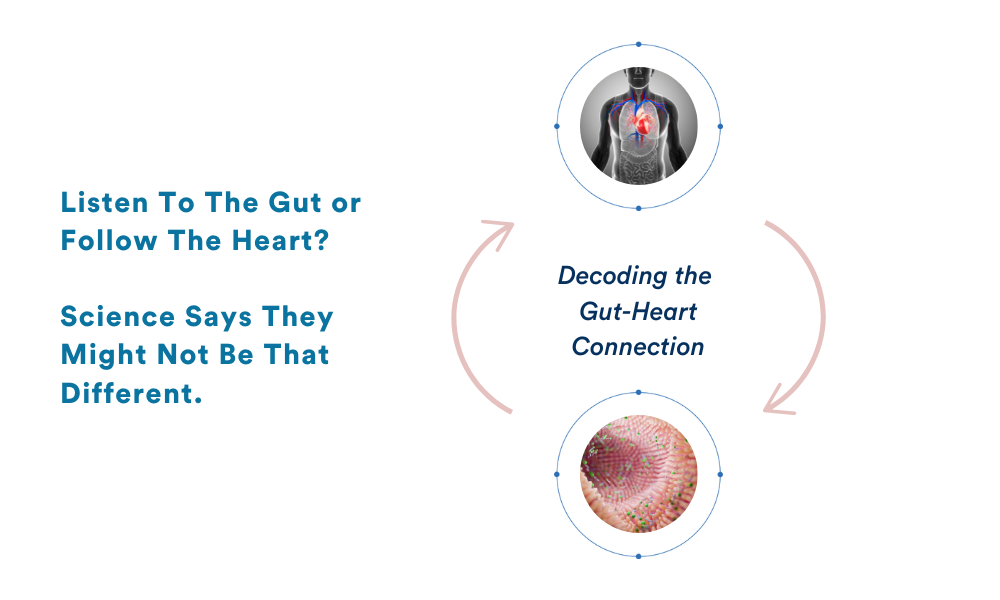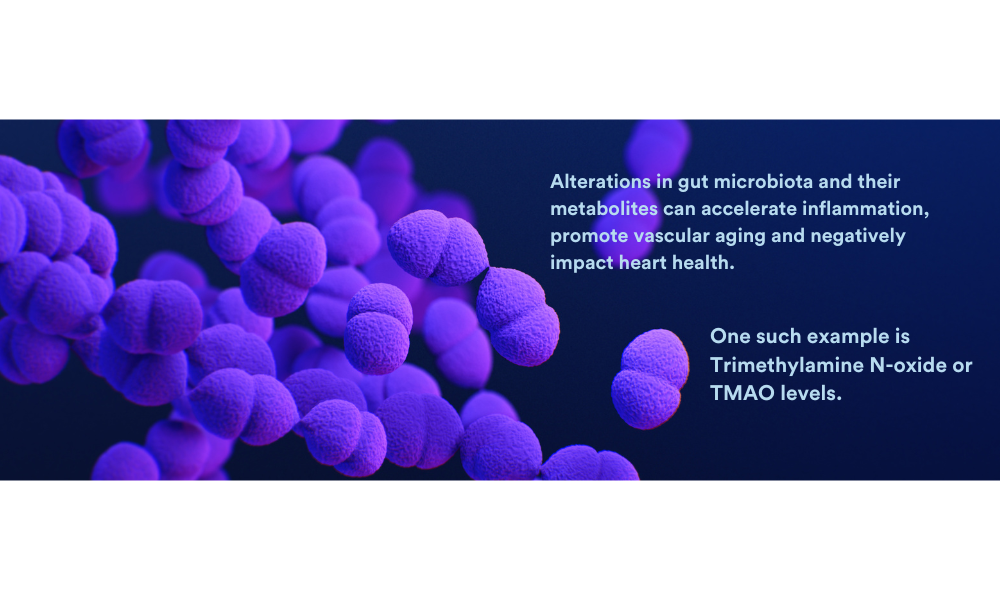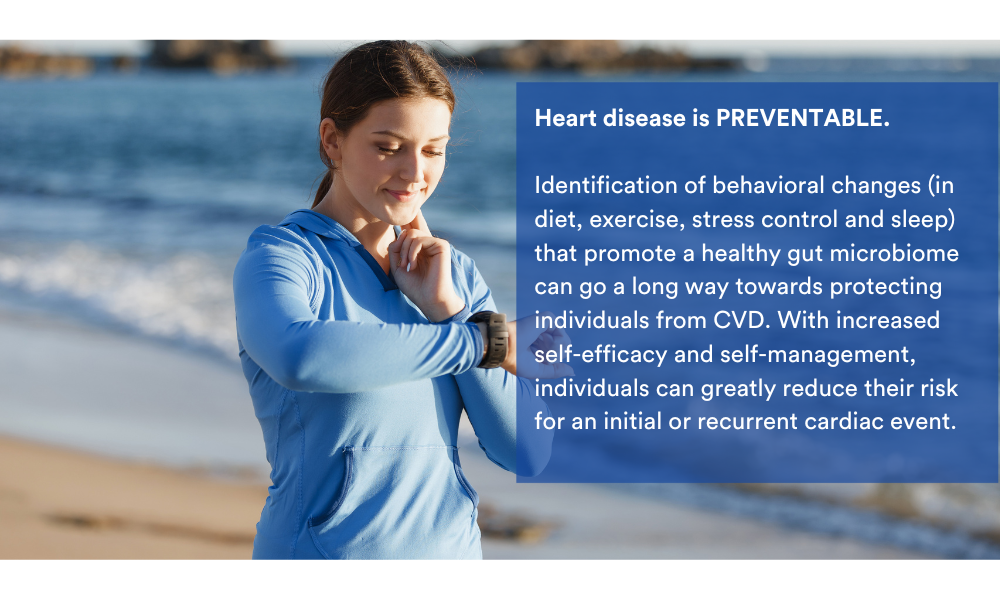Heart Month 2025 : Decoding The Gut-Heart Connection
Posted at : 02-07-2025 | 7 mins read

Heart disease (cardiovascular disease or CVD) is arguably the leading health concern in the United States and most of the developed countries.
- Atherosclerotic CAD (coronary artery disease), stroke, angina pectoris (chest pain) and congestive heart failure are four of the most prevalent CVDs/concerns.
- Poor diet, physical inactivity and smoking (including passive smoking) are considered the top three proximal risk factors for CVD.
- These factors (along with other traditional risk factors such as age, family history, history of hypertension, dyslipidemia, type 2 diabetes and obesity) can lead to arterial inflammation, the central mechanism for CVD.
During the investigation of biological processes that contribute to arterial wall thickening, plaque formation and subsequent cardiac events, the gut microbiome has been identified as an important player that influences cardiovascular risk factors and ultimately, heart disease manifestation.

Trimethylamine N-oxide (TMAO) increases with aging, naturally. This is a metabolite produced by gut bacteria such as Escherichia fergusonii, Clostridium asparagiforme - to name a few.
In one study, TMAO administration lead to greater oxidative stress and higher p53 activity leading to increased vascular aging. This suggests that TMAO levels influence the host’s susceptibility to vascular conditions such as hypertension and atherosclerosis.
There are findings from more studies which link TMAO levels with other cardio-metabolic conditions, including Metabolic Syndrome (MetS), which can greatly increase CVD risk. Elevated levels of TMAO have also been linked with modified nitric oxide synthase activity, which may hinder the production of nitric oxide and promote vasoconstriction. These findings suggest that gut microbiota composition and metabolite levels regulate blood pressure, and are important variables that impact cardiovascular outcomes.
Gut microbiota are involved in cardiovascular processes via other metabolites and their actions, too. LipoPolySaccharides (LPS) [membrane components of certain Gram-negative bacteria] are known as mediators of inflammatory processes that increase susceptibility to atrial fibrillation and congestive heart failure.
Microbial balance can lead to an overgrowth of pathogens such as Shigella, Campylobacter, and Salmonella. Certain patterns of pathogen overabundance are observed in heart patients, as seen in this study in relation to heart failure. In the absence of timely intervention and microbiome restoration, CVD outcomes may be much more severe, requiring advanced medical care.
However, consistent dietary change can enhance the levels of microbial metabolites that lower CVD risk. One such example is sodium intake. There is a direct link between dietary sodium and SCFA (Short Chain Fatty Acid) levels, which underscores the importance of dietary approaches like the DASH or the Mediterranean diet that emphasize on a heart-healthy eating pattern.

References
Drapkina, Oxana M et al. “Targeting Gut Microbiota as a Novel Strategy for Prevention and Treatment of Hypertension, Atrial Fibrillation and Heart Failure: Current Knowledge and Future Perspectives.” Biomedicines vol. 10,8 2019. 19 Aug. 2022, doi:10.3390/biomedicines10082019
Karbach, Susanne H et al. “Gut Microbiota Promote Angiotensin II-Induced Arterial Hypertension and Vascular Dysfunction.” Journal of the American Heart Association vol. 5,9 e003698. 30 Aug. 2016, doi:10.1161/JAHA.116.003698
Ke, Yilang et al. “Gut flora-dependent metabolite Trimethylamine-N-oxide accelerates endothelial cell senescence and vascular aging through oxidative stress.” Free radical biology & medicine vol. 116 (2018): 88-100. doi:10.1016/j.freeradbiomed.2018.01.007
Chen, Sifan et al. “Trimethylamine N-Oxide Binds and Activates PERK to Promote Metabolic Dysfunction.” Cell metabolism vol. 30,6 (2019): 1141-1151.e5. doi:10.1016/j.cmet.2019.08.021
Jiang, Shan et al. “Gut microbiota dependent trimethylamine N-oxide aggravates angiotensin II-induced hypertension.” Redox biology vol. 46 (2021): 102115. doi:10.1016/j.redox.2021.102115
Liu, Yarong, and Min Dai. “Trimethylamine N-Oxide Generated by the Gut Microbiota Is Associated with Vascular Inflammation: New Insights into Atherosclerosis.” Mediators of inflammation vol. 2020 4634172. 17 Feb. 2020, doi:10.1155/2020/4634172
Pasini, Evasio et al. “Pathogenic Gut Flora in Patients With Chronic Heart Failure.” JACC. Heart failure vol. 4,3 (2016): 220-7. doi:10.1016/j.jchf.2015.10.009
Chen, Li et al. “Modest Sodium Reduction Increases Circulating Short-Chain Fatty Acids in Untreated Hypertensives: A Randomized, Double-Blind, Placebo-Controlled Trial.” Hypertension (Dallas, Tex. : 1979) vol. 76,1 (2020): 73-79. doi:10.1161/HYPERTENSIONAHA.120.14800
Pasini, Evasio et al. “Pathogenic Gut Flora in Patients With Chronic Heart Failure.” JACC. Heart failure vol. 4,3 (2016): 220-7. doi:10.1016/j.jchf.2015.10.00
Health KidsNavipoint
Health AdultsNavipoint
Health LongevityGut Balance Program

Chicago, USA and Hyderabad, India
Headquarters in Chicago, IL USA
© 2025-2026 All Rights Reserved.
Terms & ConditionsPrivacy Policy







